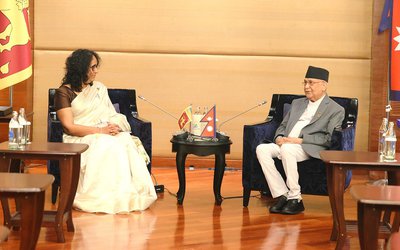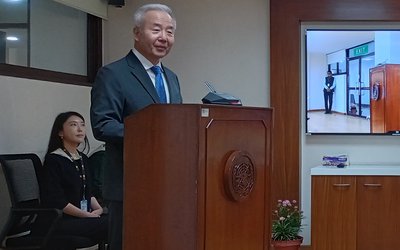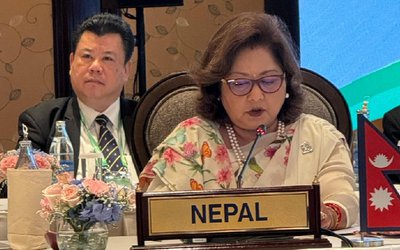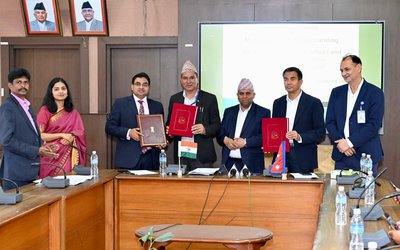
Kalpana Magar, a resident of Miklajung Rural Municipality Ward no 6, Khabe, has demonstrated the positive impact of skill training on the families of migrant workers.
As the wife of a migrant worker, Magar previously relied on remittance money sent by her husband for seven years. However, after receiving handloom training a year ago, she has been able to earn her own income and save the remitted money.
This financial independence has enabled her to support household expenses and save money for potential investments. Magar
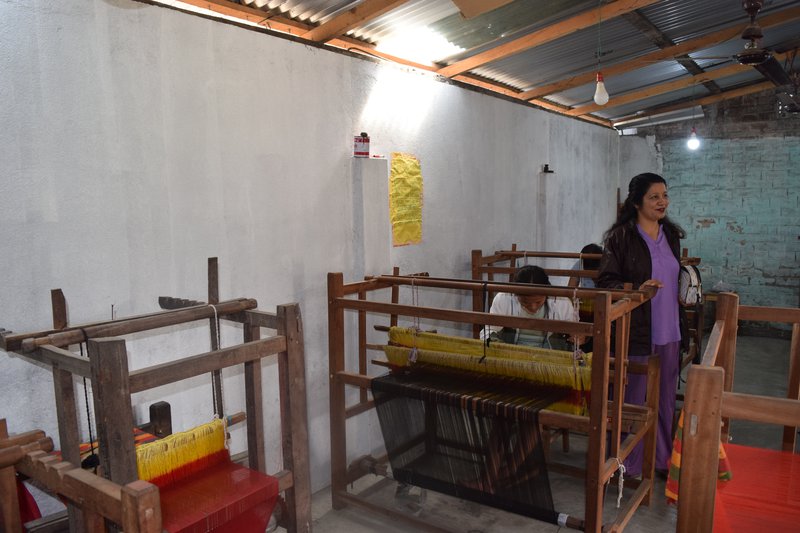
, a mother of two daughters, is a prime example of how income-oriented training can empower women.
In Ward 7 of Miklajung Rural Municipality, where many families depend on remittances, there has been a notable increase in Dhaka production thanks to over 100 looms operated by women from migrant worker families.
Kamala Shrestha, a 35-year-old resident of Rachna Nagar in MiklajungMunicipality Ward 8 and a graduate of vocational skill training (VST) level I, has a similar narrative to share. She has successfully transitioned from a life of poverty and dependence to attaining a moderate income and self-sufficiency.
Upon the completion of her training in 2023, Bimla Tamang, a 38-year-old resident of MiklajungRural Municipality ward no 8, was provided with a handloom by the Rural Municipality to weave Dhaka during her leisure time. This training has significantly impacted her life. With the increasing demand for Dhaka, she no longer encounters market-related challenges.
Bimla now earns around Rs. 20,000.00 ($130) per month, which adequately supports her family of five, including her father-in-law, mother-in-law, and two daughters. Kamala is also utilizing her earnings to cover daily expenses, including her children's school fees.
Thanks to the skills acquired from the Samriddhi Project and the handloom provided by the Local MiklajungRural Municipality ward 10, Bimala has successfully established her own enterprise named Bimala Dhaka Udhyog to build her own brand.
Bimla, who now earns approximately Rs. 25,000.00 (US$160) per month, has successfully employed two college students in her factory. She is satisfied with her income, and her husband, who previously worked in the Gulf for nearly eight years, has chosen to support her.
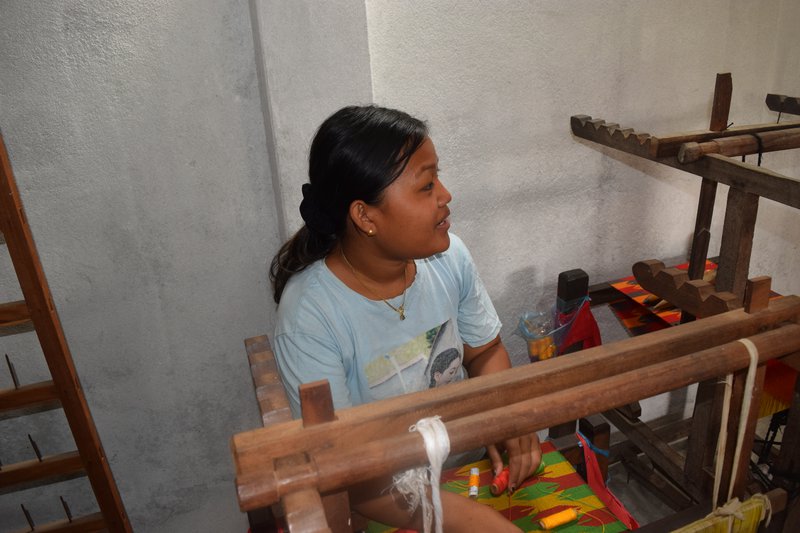
With the increasing number of Dhaka weavers and handlooms, small cooperatives have taken the initiative to organize marketing efforts and establish showrooms in cities like Urlabari. Sarawswati Rijal, a certified vocational skill trainer in Dhaka, explains that they have opened shops in Urlabari and Miklajung to showcase their products and receive orders.
Sanjeev Kumar Shrestha, an expert in Value Chain & Markets and a National Consultant at the International Fund for Agricultural Development (IFAD), stated that Dhaka weaving and Samriddhi's off-farming programs have effectively demonstrated the combination of skills, market linkages, value chain development, and promotion of new technology to alleviate poverty in rural Nepal.
Due to the high demand for Dhaka products in the hilly areas of Nepal, their small cooperative receives numerous orders of various sizes from different parts of the country, including Kathmandu. As a result, trainers like Rijal, who have been providing training for the past 16 years, remain busy throughout the year.
Implemented by a private training and employment service provider in partnership with the Samriddhi Project, Magar, the wife of a migrant worker, successfully completed a three-month Vocational Skill Training (VST) Level 1 in Dhaka weaving. This initiative was carried out in close collaboration with the Miklajung Rural Municipality under the Decent Work program. Magar then began working using a handloom provided by the local municipality.

Relying on the remittances from her husband, who has been working in Kuwait for the past ten years, Magar's weaving skills and access to handlooms have significantly increased her income. As a mother of two young children, Magar has transitioned from having no income to earning around Rs.18,000.00 per month, while also creating job opportunities for two other women.
"For the past year, I have been able to support my household solely through my earnings. By dedicating more time, I am confident that my income will continue to grow. I currently spend approximately 8-10 hours daily utilizing my free time."
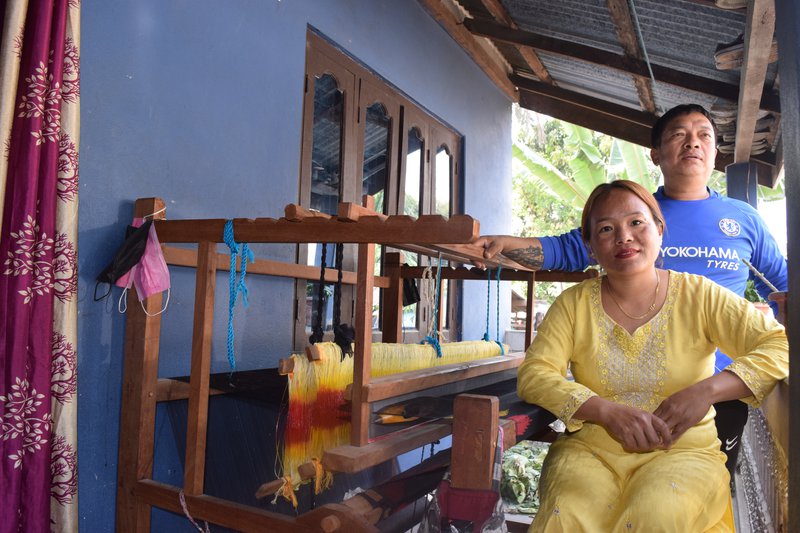
Living in a rented room and sending her children to school, Magar faced challenges in managing the household. With a population of 40,000, Miklagunj Rural Municipality has now become a key area in Dhaka.
Following her graduation from VST a year ago, Laxmi Devi Magar, aged 36 and the wife of a returning migrant worker, has converted her residence into a hub for Dhaka weaving.
Transitioning from a housewife reliant on her husband's remittances, Magar, a resident of Ward 8 in Miklajung Rural Municipality, now generates an income of around Rs. 25,000.00 per month. "My husband came back home 10 months ago after working as a migrant worker in the Gulf for 12 years.

He has been helping me with daily household tasks, farming activities, and marketing our products. His assistance has enabled me to focus more on weaving, leading to increased productivity. With my stable earnings and agricultural yield, my husband has decided against going abroad," mentioned Magar, who has two children aged 16 and 12. Narayan Prasad Magar, aged 40 and Laxmi Devi Magar's spouse, has opted not to return to the Gulf.
"If there are employment opportunities here, I don't see the necessity to travel abroad. The

past year has demonstrated that I can earn a comparable amount to what I earned in the Gulf by supporting my wife."
Following the Samriddhi training, a significant number of women in the region who were previously unemployed and facing financial difficulties have now secured employment opportunities.
The weavers in Dhaka have been producing a variety of items like handkerchiefs, mufflers, shawls, shirts, and more. Despite the fluctuating nature of my earnings due to varying workloads, I typically bring in a net income ranging from Rs. 18,000 to Rs. 21,000 after deducting expenses.
This income, earned through home-based work, is sufficient to meet our needs. Completing the training has brought about a remarkable change in my life. Previously, meeting our basic necessities was a challenge, but now, I am able to cover our household expenses with my own earnings.
The guidance provided by SAMRIDDHI has steered us in the right direction, and it is now up to us to put in the necessary effort. I am satisfied and content with my work, having attained financial independence and no longer relying on others for support.

The Samriddhi initiative has led to significant transformations in the past three years, particularly in enhancing the capabilities of rural women through Vocational and Skill Training. Project Manager Saroj Prasad Guragain expressed gratitude for the diligent efforts of Helvetas Nepal in executing the job component effectively over the last two years. The collaborative work of the entire project team has resulted in positive outcomes.
Dr. Prabin Manandhar, the country director of Helvetas Nepal, views the current progress as noteworthy. Despite initial uncertainties about continuing the Samriddhi project, he chose to proceed and assemble a new team to implement the job component. The successful outcomes have empowered and changed the lives of women in the region.
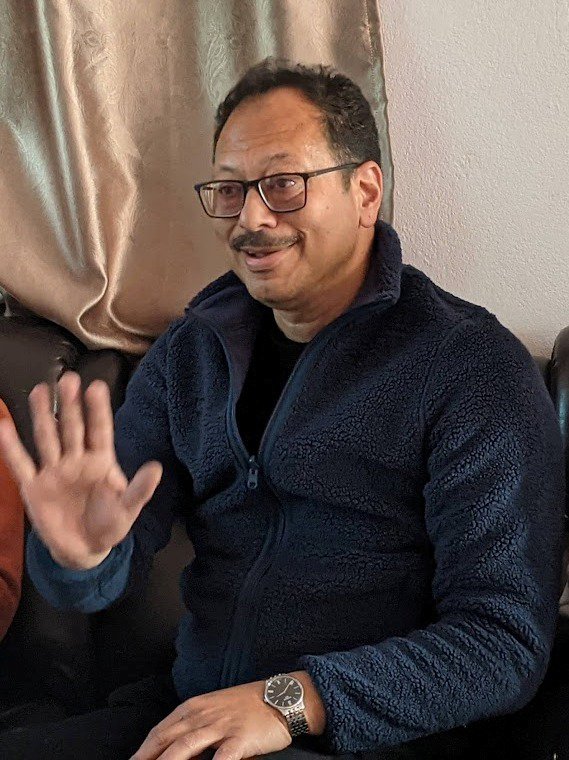
The success of VST level I training in Dhaka highlights the significant impact it can have. By identifying key areas and delivering training based on local needs, positive changes can be brought about to enhance the lives of rural women.
Due to the result-based financing model of this project, it is necessary for each training session to produce tangible outcomes before receiving full compensation for the course. Despite encountering some challenges along the way, the project has achieved success through the dedicated efforts since its inception. The recent progress made by the project has also been recognized by the IFAD Mission.
One notable aspect of the project's successful performance is the successful implementation of all planned skills training under the Decent Jobs sub-component. This includes the completion of Vocational Skills Training Round 3, which was previously uncertain. The project management, procurement team, and Helvetas are deserving of praise for their professionalism and ability to meet tight deadlines. The successful completion of Round 3 is a significant achievement.
According to Sandip Poudel, the lead of Helvetas-Nepal, a total of 1,273 individuals, consisting of 548 males and 725 females, have completed training in 24 different occupations in 2023 through collaboration with the Local government and Private Led Training and Employment Service Providers. Additionally, a total of 12,838 individuals, including 5,608 males and 7,230 females, have graduated in 36 occupations in 2023 from both the open market and supply chain farmer group members.
Poudel attributed the current success to the diligent efforts of all staff members and stakeholders involved in the project's implementation from inception to the present.
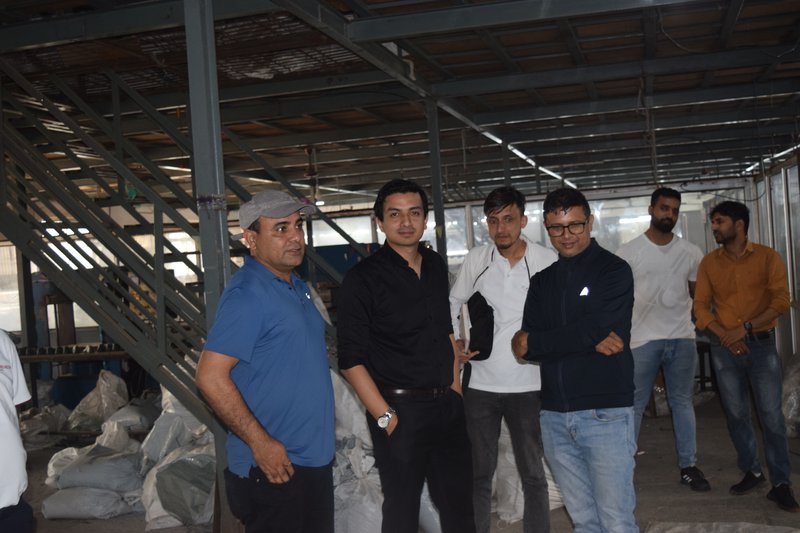
As the current phase of the project approaches its conclusion, Samriddhi is proactively tackling challenges related to wage labor and the significant migration from rural to urban areas and abroad. Covering 16 districts in Koshi, Madhesh, and Bagmati Province, IFAD and the MoICS have made a positive impact on more than 200,000 beneficiaries through financial education initiatives that have reached approximately 300,000 individuals.
Dhaka weaving has significantly increased the household income of numerous marginalized communities, fostering economic independence and enabling them to generate income in productive sectors.

Keshab Poudel
Poudel is the editor of New Spotlight Magazine.
- FM Dr. Deuba’s India Visit: Mission Aborted
- Mar 26, 2025
- AMBASSADOR MAEDA TORU: Warm Regards
- Mar 24, 2025
- PRO-MONARCHY MOVEMENT: Rising Dissatisfaction
- Mar 23, 2025
- Dr. PRABIN MANANDHAR: Person With Humility
- Mar 16, 2025
- US SUSPESION OF GRANT: Impact On Nepal
- Mar 10, 2025

